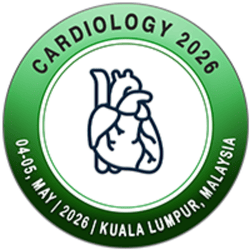.png)
Shadab Rauf
Octavia Hospital, IndiaPresentation Title:
Correlation between the values of immature platelet fraction and mean platelet volume with the extent of Coronary Artery Disease in patients with non ST segment elevation myocardial infarction
Abstract
The identification of new markers of thrombotic risk and early diagnosis of Non-ST-segment Elevation Myocardial Infarction (NSTEMI) could allow the optimization of the therapy and predict short and long-term prognosis. We aimed to assess the impact of Immature Platelet Fraction (IPF) and Mean Platelet Volume (MPV) levels on the extent of Coronary Artery Disease (CAD) in patients with NSTEMI undergoing coronary angiography. This is a prospective observational study in which 100 subjects of Non-ST Elevation Myocardial Infarction were recruited. For the measurement of platelet count, IPF and MPV samples were analyzed by an automated hematology analyzer (Sysmex XN 1000). Patients were subjected to coronary angiography as per institutional protocol and the extent of coronary artery lesion was noted. Our study showed a cutoff value of MPV (fL) ≥ 10.6 can predict the involvement of the left anterior descending artery (LAD) with a sensitivity of 84%, and a specificity of 50%. With the cutoff of IPF (%) ≥ 2.4, it can even predict the type of disease i.e., Double Vessel Disease (DVD), or Triple Vessel Disease (TVD) with a sensitivity of 97%, and a specificity of 19%. Mean IPF values and MPV levels were significantly higher in patients with LAD involvement i.e., 4.40 ± 1.72% (p = 0.003) and 12.45 ± 1.88 (p = 0.030) respectively than in patients without involvement of LAD i.e., 2.78 ± 1.50% and 11.08 ± 2.19 respectively. Immature platelet fraction and mean platelet volume were significantly associated with the involvement of the left anterior descending artery which was the most commonly involved vessel in patients with NSTEMI. Mean platelet volume was also associated with TVD which was statistically significant. MPV and IPF can be useful early independent hematologic markers to identify patients with a higher risk for significant CAD as they are readily available and inexpensive.
Biography
Shadab Rauf is a distinguished cardiologist based in India, renowned for his compassionate approach to patient care and his expertise in diagnosing and treating cardiovascular conditions. Born and raised in Varanasi, he developed an early passion for medicine, driven by a deep desire to help others and make a meaningful impact on their health and well-being. He has pursued his medical education with dedication, completing his DM in Cardiology from the prestigious Dr. Ram Manohar Lohia Hospital in New Delhi, one of India's leading institutions for advanced medical training and research. His rigorous academic background and hands-on experience in cardiology have shaped him into a skilled and empathetic doctor, well-versed in the complexities of heart diseases and their management. Outside of his professional life, Dr. Rauf remains passionate about advancing his knowledge in the field of cardiology and contributing to the growing body of medical research. His career is a testament to the power of compassion and expertise, and he remains a dedicated advocate for heart health, making a lasting impact on the lives of those he treats.


